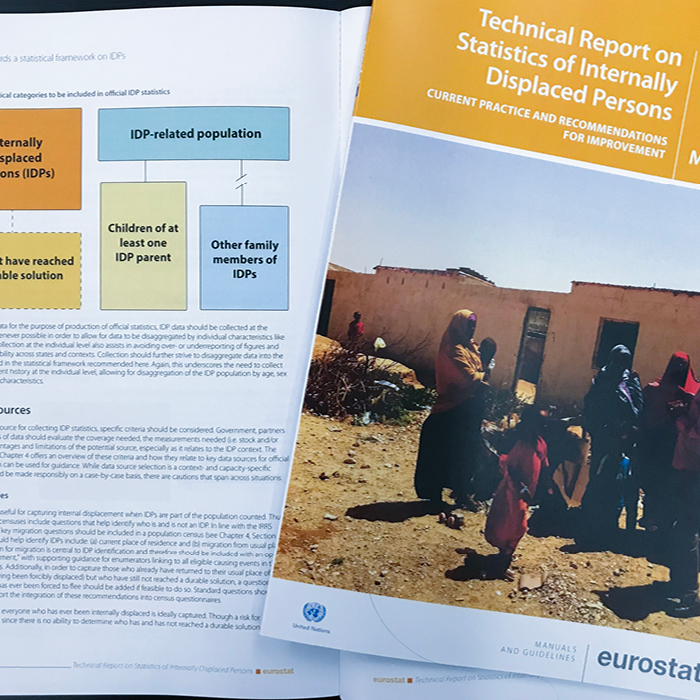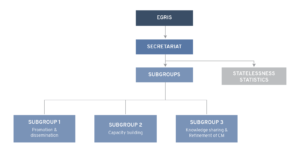The International Recommendations on IDP Statistics (IRIS) outline an internationally-agreed framework for countries and international organisations to improve the production, coordination, and dissemination of high-quality official statistics on internally displaced persons that are consistent over time and comparable between regions and countries.
They are the result of a joint and consolidated effort of experts from national statistical systems and international organisations, led by JIPS with support from the UN Statistical Division (UNSD) and IDMC, within the Expert Group on Refugee and IDP Statistics (EGRIS). Unanimously adopted at the UN Statistical Commission (UNSC) 51st session in 2020, the IRIS build on the Technical Report on Statistics on Internally Displaced Persons – a stocktake of existing approaches to collecting IDP statistics and statistical quality issues. They align with the International Recommendations on Refugee Statistics, which were also developed by the EGRIS and endorsed by UNSC at its 49th session in 2018.

The IRIS offer critical guidance on how to improve the quality and availability of official statistics on internally displaced persons. Namely, they provide:
The accompanying Compilers’ Manual offers hands-on guidance and refined methodology for countries working to put the international recommendations on refugee and IDP statistics to practice. The Manual is meant as a living document and will be updated and refined as the implementation of the recommendations progresses.
The IRIS are the first ever official recommendations on IDP statistics. They mark a critical milestone towards nationally-owned and high-quality data on internally displaced persons that can inform national and international policymaking, development planning, and evidence-driven response.
They allow for the incorporation of IDP statistics into the country’s statistical system and the joint use of related data from different sources. This helps increase accountability and support policy debate, stronger advocacy and joint responses by governments and humanitarian and development actors.
Better quality statistics on forced displacement that are comparable over time and across contexts are also required to implement and monitor several international agreements, including the 2030 Agenda for Sustainable Development and the global compacts. They are furthermore needed to monitor progress towards the UN Secretary General’s ambitious call to reduce new and protracted internal displacement by at least 50 per cent by 2030.
The Expert Group on Refugee and IDP Statistics (EGRIS)
Established by a decision of the UN Statistical Commission (UNSC) at its 47th session in 2016, the Expert Group was initially mandated with developing international recommendations, standards and guidance to improve statistics on forced displacement. During phase 1, EGRIS developed the International Recommendations on Refugee Statistics (IRRS) and the Technical Report on Statistics on IDPs, both of which were formally endorsed at the 49th UNSC session in 2018. The endorsement of the International Recommendations on IDP Statistics at the 51st session in 2020 marked the conclusion of phase 2. At the same occasion the UNSC welcomed the development of the Compilers’ Manual and approved a third mandate. Phase 3 will focus on the implementation of the new international recommendations over the five year period till 2024. The JIPS -EGRIS Conference in September 2020 marked a first milestone achievement.
EGRIS is composed of members from 45 national statistics authorities and 20 organisations. For its third mandate, the Expert Group has divided activities into three subgroups: (1) promotion and dissemination, (2) capacity development and (3) knowledge sharing and refinement of the Compilers’ Manual. JIPS continues its strong engagement in the EGRIS as a member of its Steering Committee, co-lead of subgroup 2 together with IOM, Côte d’Ivoire and UNHCR, as well as an active member of subgroups 1 and 3.

Steering Committee: UNHCR, Statistics Norway, Eurostat, JIPS, the UN Statistical Division (UNSD), the World Bank, Columbia, the Kurdistan Region of Iraq, Ukraine, IDMC, IOM, JDC and UN-ESCAW.